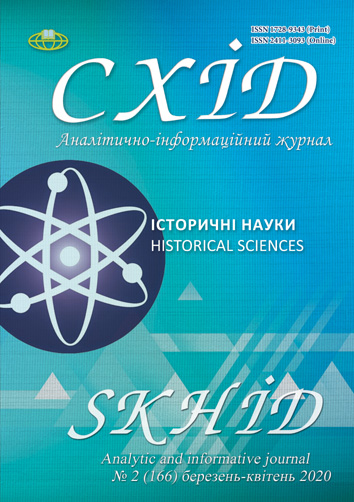Human rights dimension in Helsinki 1975: Canadian concern the situation in the Soviet Union
DOI:
https://doi.org/10.21847/1728-9343.2020.2(166).199291Keywords:
Conference on Security and Co-operation in Europe, Canada, Soviet Union, Ukrainian Canadians, human rights violationsAbstract
During the 1960s and 1970s, Western countries, including Canada, became increasingly aware of and responded to human rights abuses abroad. The ideological, military and economic Cold War with the Soviet Union has intensified Ottawa’s focus on human rights abuses in the country. For many Canadian observers, the communist system inherently repressed a number of human rights, including the freedoms of religion, movement, and property ownership. This concern was manifested during the Conference on Security and Co-operation in Europe (CSCE). The Final Act of the CSCE was signed at Helsinki on August 1, 1975 by the heads of government of the states of Europe and of Canada and the United States. Helsinki Final Act contained far-reaching agreements on political borders, trade, and human rights norms, has often been described as the “high point of détente”. It is intended to establish the basis for the development of future relations between their countries and peoples. Among other the participants promised to respect fundamental freedoms, including the freedom of thought, conscience, religion or belief. Also pledges were given to make it easier for families to unite across borders and visit one another. However, Canadian Government made less likely to press human rights concerns than might have been expected. Ottawa often felt that more could be gained in its relationship with the Soviet Union by overlooking human rights violations. Such an approach was not uniformly supported in Parliament or in nongovernmental circles, which led to ongoing negotiations about the proper place of human rights concerns in Soviet-Canadian relations throughout this period. Despite uneven attention by Canadian Government, the growing prominence of human rights issues helped to ensure their enduring salience in the years that followed.Downloads
References
Brett, R. (1996). Human Rights and the OSCE. Human Rights Quarterly. 18: 3, pp. 668-693. DOI: https://doi.org/10.1353/hrq.1996.0033.
Clément, D. (2012). Human Rights in Canadian Domestic and Foreign Politics: From Niggardly Acceptance to Enthusiastic Embrace. Human Rights Quarterly. 34. pp. 751-778. DOI: https://doi.org/10.1353/hrq.2012.0044.
Davy, R. (2009). Helsinki myths: setting the record straight on the Final Act of the CSCE, 1975. Cold War History. 9: 1, pp. 1-22. DOI: https://doi.org/10.1080/14682740802490380.
Fascell, D. B. (1979). The Helsinki Accord: A Case Study. The Annals of the American Academy of Political and Social Science. 442: 69-76. DOI: https://doi.org/10.1177/000271627944200109.
Isajiw, Kh. (2016). Perehovory na zakhyst prav liudyny i dysydentiv v epokhu Sovietiv. Spohady. Kyiv: Hamazyn, 328 s. (in Ukrainian).
Lukianenko, L. (2012). Z chasiv nevoli. Knyha piata: Oderzhymi. Kyiv: Tampodek XXI, 648 s. (in Ukrainian).
Mahoney, K. E. (1992). Human Rights and Canada’s Foreign Policy. International Journal. 47. pp. 555-594. DOI: https://doi.org/10.2307/40202784.
Matthews, R. and Pratt, C. (1985). Human Rights and Foreign Policy: Principles and Canadian Practice. Human Rights Quarterly. 7: 2, pp. 159-188. DOI: https://doi.org/10.2307/762078.
Nolan, C. J. (1985). The Influence of Parliament on Human Rights in Canadian Foreign Policy. Human Rights Quarterly. 7: 3, pp. 373-390. DOI: https://doi.org/10.2307/762056.
Paust, J. J. (1982). Transnational Freedom of Speech: Legal Aspects of the Helsinki Final Act. Law and Contemporary Problems. 45: 1, pp. 53-70. DOI: https://doi.org/10.2307/1191295.
Romano, A. (2009). Détente, Entente, or Linkage? The Helsinki Conference on Security and Cooperation in Europe in U.S. Relations with the Soviet Union. Diplomatic History. 33: 4, pp. 703-722. DOI: https://doi.org/10.1111/j.1467-7709.2009.00802.x.
Siromskyi, R. (2015). “Mii pryizd ye vyiavom vdiachnosti Kanady”: do istorii vidvidyn kanadskym premier-ministrom P. Trudo Kyieva u travni 1971 r. Mizhnarodni zviazky Ukrainy: naukovi poshuky i znakhidky. 24. S. 126-140. (in Ukrainian).
Snyder, S. B. (2010). “Jerry, Don’t Go”: Domestic Opposition to the 1975 Helsinki Final Act. Journal of American Studies. 44: 1. pp. 67-81. DOI: https://doi.org/10.1017/s0021875809991332.
Thompson, A. S. (2018). Canada, human rights, and the future of the liberal international order. International Journal. 73: 2, pp. 299-307. DOI: 10.1177/0020702018788550.
Trudeau, P.-E. (1990). The Values of a Just Society. In Axworthy, T., and Trudeau, P.-E. (eds.). Towards a Just Society: The Trudeau Years. Markham: Viking, pp. 357-360.
Downloads
Published
How to Cite
Issue
Section
License
Copyright (c) 2020 Руслан Богданович Сіромський

This work is licensed under a Creative Commons Attribution-NonCommercial-NoDerivatives 4.0 International License.
1. Authors bear responsibility for the accuracy of facts, quotations, numbers and names used.
2. Manuscripts are not sent back.
3. The publisher does not always agree with the authors' opinion.
4. The authors reserve the right to authorship of the work and pass the first publication right of this work to the journal under the terms of a Creative Commons Attribution-NonCommercial-NoDerivatives 4.0 International License. This license allows others to distribute (copy) the published work for non-commercial purposes, provided there is mandatory attribution to its authors and a link to the first publication in our journal.
5. The authors have the right to conclude separate supplement agreements that relate to non-exclusive work distribution in the form in which it has been published by the journal (for example, to upload the work to the online storage of the journal or publish it as part of a monograph), provided that the reference to the first publication of the work in this journal is included.

